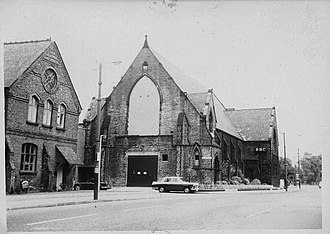The Mancunian Film Corporation was a British film production company founded by the film distributor John E. Blakeley in 1934. The company specialised in low-budget comedies and programme fillers, particularly aimed at cinema goers in the North of England, and is notable for establishing the only regional feature film studio outside London and the South East of England. The corporation produced more than sixty films, but although profitable they were not great critical successes.[1]
Blakeley aimed to make screen stars of popular northern comedians. His first hit was Boots! Boots! (1934), starring George Formby, quickly followed up with Off the Dole1935 British film starring George as an unemployed man forced to become a private detective when his dole money is stopped, because he has not been looking for work. the following year, also starring George Formby, who subsequently became a nationally celebrated star. Other popular northern comedians featured included Norman Evans, Jimmy James and Sandy Powell; the corporation’s emphasis on comedy films earned it the nickname of Jollywood.[1]
Films were produced on very small budgets, and production values were so low that some scenes were filmed in semi-darkness to hide the lack of set decorations.[2] Critics of the studio’s output dubbed it the Corn Exchange, in reference to Manchester’s Corn Exchange, “corn” being a slang term for unoriginal, poor-quality humour.[3]
Dickenson Road Studios
Until 1947 Blakeley transported crew and stars down to studio facilities in London, but the cost and limited hire time available persuaded him to open the first feature film studio in Manchester, in a converted Methodist church in Rusholme.[1] The building was converted at a cost of £70,000,[4] with funding from the National Film Finance Corporation (NFFC), which provided grants to support independent British studios.[3]
In 1950 the NFFC demanded that Blakeley repay its £50,000 loan. Its chairman, Lord Reith, expressed dissatisfaction with the quality of Mancunian’s comedy production of Over the Garden Wall (1950), Reith said it was not “of as high a quality as the Corporation would have wished”. This created a funding crisis for the studio, but Blakeley managed to raise the necessary cash partly by hiring out the facilities at Dickenson Road to other production companies, such as Hammer Horror. Blakeley retired in 1953, when control of the Mancunian Film Corporation passed to his son Tom.[5] The Dickenson Road Studios were sold to the BBC in 1954, becoming a regional television studio, the first outside London.[2] But despite the loss of its studios the company continued to make films into the 1960s, once again using hired facilities in London. Later films were mainly crime-based however, as comedy had by then largely become the domain of television.[1]
The Dickenson Road studios were demolished in 1975, after operations were transferred to the BBC’s new building at New Broadcasting House on Oxford Road.[6] The studio’s entire film archive was lost when a fire swept through Kay Laboratories in 1980.[4]


